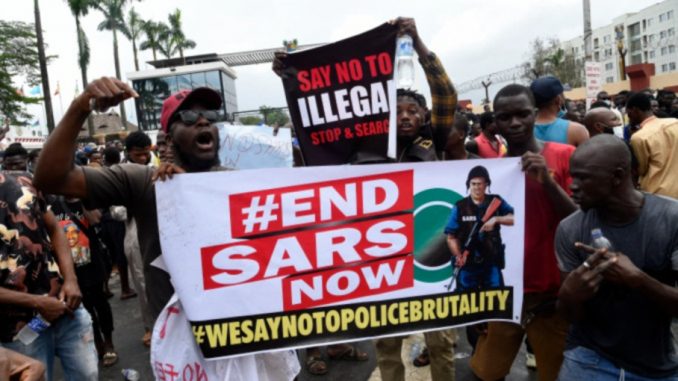
The Canadian court holds that the Nigerian is inadmissible to the North American country having contributed to crimes against humanity
A federal Canadian court in Ottawa, Ontario, has affirmed the decision of the Immigration Department to deny a former operative of the disbanded Special Anti-Robbery Squad (SARS) of the Nigeria Police Force entry into the North American country.
In what highlights how far the ripples of the atrocities of the defunct notorious police unit have travelled globally, the foreign government had rejected Olushola Popoola solely on the grounds that he used to be an operative of SARS.
Revealing the foreign government’s damning position on SARS that may smear all its former operatives intending to travel to Canada, the court upheld the findings of the immigration department to the effect that “the Nigerian Police Force, and the SARS in particular, have committed crimes against humanity from 2002 to 2015”.
The judge, Sébastien Grammond, delivering judgment on Mr Popoola’s case, held that by merely handing over suspects “to the criminal investigation department” despite knowing that they “would be subject to human rights violations,” the applicant without necessarily participating directly in the SARS’ crimes had made “a significant contribution” to the unit’s atrocities.

The judge ruled, “The main part of the ID’s decision is devoted to the issue of whether Mr Popoola made a knowing and significant contribution to the SARS’s criminal activity.
“A finding that Mr Popoola engaged in crimes against humanity does not require proof that he personally tortured detainees — which he denies. Rather, his contribution to the organization’s crimes must be assessed according to the test laid out by the Supreme Court of Canada in Ezokola v Canada (Citizenship and Immigration), 2013 SCC 40, [2013] 2 SCR 678 [Ezokola].
“In this regard, the ID considered that Mr Popoola voluntarily joined the Nigerian Police Force; that he spent five years with the SARS, a unit known for being especially brutal; that he admitted knowing about the prevalence of torture and mistreatment of detainees in the organization, although he tried to minimise its scope in his testimony; and that he resigned for personal reasons, not because he learned of human rights abuses. As to his contribution to the organisation’s crimes, the ID concluded as follows:
“Since Mr Popoola reasonably knew that when he was a member of the SARS the suspects he handed over to the criminal investigation department would be subject to human rights violations, the tribunal finds this to be a significant contribution to the criminal purpose of the organization since he had the knowledge of what could befall the individual subject to investigation.”
The court in the judgment delivered on April 8 and seen by PREMIUM TIMES, on Tuesday, dismissed Mr Popoola’s application for a review of the Immigration Department’s decision to deny him entry into Canada.
He sued the Canadian Minister of Public Safety and Emergency Preparedness, as the sole defendant.
Popoola’s case dismissed
But dismissing the suit, the court ruled that the Immigration Department had found him to be inadmissible to Canada “because there are reasonable grounds to believe that he engaged in crimes against humanity while serving as a police officer in Nigeria.”
“He now seeks judicial review of his determination of inadmissibility. I am dismissing his application, because the decision-maker reasonably assessed the relevant factors for deciding whether Mr. Popoola made a knowing and significant contribution to the crimes committed by the Nigerian Police Force,” the judge added
Ex-SARS operative’s profile
The judgment, which gave the highlights of Mr Popoola’s background, stated the applicant had completed his training and became a member of the Nigeria Police Force in 2002.
From 2002 to 2005, he was a member of the Special Anti-Robbery Squad [SARS] in Abuja. He was then transferred to the anti-robbery unit (not to be confused with the SARS) in Lagos until 2009. From 2009 to 2011, he returned to the SARS, this time, in Lagos.
In 2011, following the death of his father, Mr Popoola resigned from the Nigeria Police Force.
In his testimony, however, the police force never formally accepted his resignation and he had to continue reporting to work.
From 2011, he was deployed to Iju as an ordinary police officer. He was then promoted to the rank of Sergeant in 2015 after which he left the Force the same year.
In 2016, he left Nigeria for the United States.
He then travelled to Canada, where he claimed refugee status.
His claim was suspended while his case was referred to the Immigration Division [ID] of the Immigration and Refugee Board for a determination of his inadmissibility.
ID’s decision
On October 15, 2019, the ID found Mr Popoola inadmissible pursuant to section 35(1)(a) of the Immigration and Refugee Protection Act, SC 2001, c 27 [the Act].
“The ID reviewed the documentary evidence and found that the Nigerian Police Force, and the SARS in particular, have committed crimes against humanity from 2002 to 2015,” the judge, Grammond, wrote.
The findings of the ID, according to the judge, “is because mistreatment and torture of police detainees is endemic in Nigeria, for a number of reasons including corruption and impunity.”
“Extrajudicial killings are frequent. The SARS, in particular, is singled out in the documentary evidence as one of the most brutal units of the Force,” the judge added.
Mr Popoola had approached the court after the Immigration Department (ID) of Canada, on October 15, 2019, found him inadmissible pursuant to section 35(1)(a) of the Immigration and Refugee Protection Act, SC 2001, c 27 [the Act].
‘Personal participation in toture in crimes against humanity, requires no proof’
The court observed that the main part of the ID’s decision is devoted to the issue of whether Mr Popoola “made a knowing and significant contribution to the SARS’s criminal activity.”
It also upheld the ID’s finding that his personal involvement in the atrocities of SARS required no proof.
“A finding that Mr Popoola engaged in crimes against humanity does not require proof that he personally tortured detainees — which he denies.
“Rather, his contribution to the organisation’s crimes must be assessed according to the test laid out by the Supreme Court of Canada in Ezokola v Canada (Citizenship and Immigration), 2013 SCC 40, [2013] 2 SCR 678 [Ezokola].
“In this regard, the ID considered that Mr Popoola voluntarily joined the Nigerian Police Force; that he spent five years with the SARS, a unit known for being especially brutal; that he admitted knowing about the prevalence of torture and mistreatment of detainees in the organization, although he tried to minimize its scope in his testimony; and that he resigned for personal reasons, not because he learned of human rights abuses.
“In this regard, the ID considered that Mr. Popoola voluntarily joined the Nigerian Police Force; that he spent five years with the SARS, a unit known for being especially brutal; that he admitted knowing about the prevalence of torture and mistreatment of detainees in the organization, although he tried to minimise its scope in his testimony; and that he resigned for personal reasons, not because he learned of human rights abuses.”
The court said it reviewed the ID’s decision on “a standard of reasonableness” and noted that “When performing such review, the court does not reweigh the relevant factors; this is the ID’s role. ”
“To succeed, an applicant must show that the decision-maker made a significant error in the treatment of the evidence. It is not enough for an applicant to reiterate arguments rejected by the decision-maker,the judge added.
It said Mr Popoola was merely asking the court to give more weight to factors favouring him and to prefer his testimony to the documentary evidence.
“Thus, he insists on the fact that he intended to leave the force in 2011, but that his resignation was never accepted and that, given Nigeria’s specific context, this meant that he has to continue reporting to work.
” He emphases his relatively low rank in the organisation. He argues that he spent most of his time with the Force in units other than the SARS, and that his five years with the SARS is a relatively short time. Lastly, he asserts that his contribution to the organization’s crimes was not significant.”
The judge noted that Mr Popoola had canvassed the same arguments before the ID, which rejected them.
“Before me, Mr Popoola does not point to any serious mistake that would render the ID’s decision unreasonable.
“Moreover, according to section 33 of the Act, the ID was only required to find “reasonable grounds to believe” that Mr Popoola contributed to crimes against humanity. In my view, the ID reasonably applied the Ezokola test to Mr. Popoola’s situation,” the judge noted.
The court also dismissed the applicant’s argument that the ID “breached procedural fairness by rejecting his testimony without providing adequate reasons.”
“As I mentioned above, the ID’s reasons for preferring the documentary evidence to certain aspects of Mr. Popoola’s testimony were adequate. Mr. Popoola also invokes the decision of the Supreme Court of Canada in Université du Québec à Trois-Rivières v Larocque, [1993] 1 SCR 471. That case involved a situation where an arbitrator refused to hear relevant evidence. This is quite different from the present case, where the ID heard Mr. Popoola’s testimony, weighed it, and gave more weight to documentary evidence with respect to certain issues. This is not a breach of procedural fairness.
“For these reasons, Mr. Popoola’s application for judicial review will be dismissed,” the court held.
SARS
SARS was disbanded in October last year following the popular #EndSARS protests against the police unit.
During the protests that went on for almost two weeks, Nigerians, mainly the youth, trooped to the streets demanding an end to police brutality perpetrated by the notorious police unit.
The unit was dreaded for extra-judicial killings and various inhuman treatments carried out by its operatives.
Following the #EndSARS protests, the police authorities proscribed the unit, while the government at both the federal and state levels subsequently set up judicial commissions of enquiry to investigate various cases of human rights violations and acts of brutality the men of SARS and other police units had been involved in.
The panels, which are expected to award compensation to victims and recommend erring police officers for disciplinary actions or criminal prosecution are still conducting hearing in most parts of the country.
